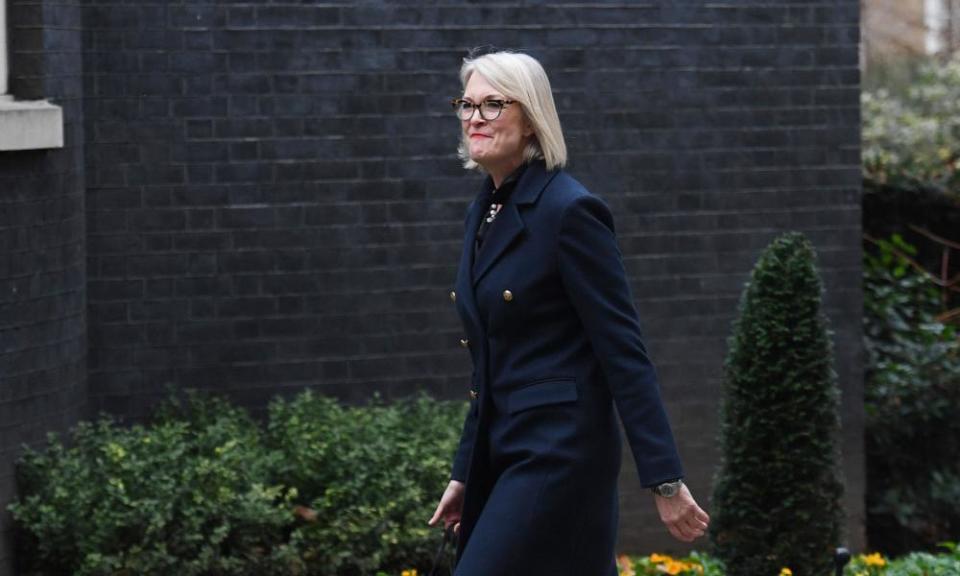May in last-ditch bid to save Brexit deal despite growing mutiny

Theresa May is set to launch a last-ditch bid to win over mutinous Tory MPs before deciding whether to proceed with a vote on her Brexit deal on Tuesday, as one of her closest cabinet allies issued a stark warning that the UK should learn from Northern Ireland about “the damage that division can do”.
With less than 48 hours to go before May faces the reckoning of her MPs, few of the 100-plus rebels who have vowed to vote against her deal showed any sign of altering their positions.
The prime minister is under intense pressure from aides and senior ministers to considering pulling the vote on Tuesday, a move Downing Street has emphatically denied will happen, though a final decision is unlikely to be made until the 11th hour.
Writing for the Guardian, the Northern Ireland secretary, Karen Bradley, said the whole UK could be scarred by divisions over Brexit, similar to the historic divides that have riven Northern Ireland, if no compromise was found.
“When the dust settles on Brexit, we must move forward in order that we can put some of the division about the nature of our country’s relationship with the European Union behind us,” she wrote.
“Northern Ireland, in particular, knows the damage that division can do, and the benefits when that division can be overcome.”
Ambitious Brexiter MPs have already begun positioning themselves in anticipation of a heavy defeat.
On Sunday, the Brexit-supporting former cabinet ministers Esther McVey and Dominic Raab hinted at their leadership intentions on the airwaves and the former foreign secretary Boris Johnson also refused to rule out a run.
Amid deep anxiety and uncertainty over the fate of her deal, the prime minister spoke by phone to Donald Tusk, the European council president, to discuss the bleak prospects for it being voted through in parliament.
Tusk later tweeted it was “an important week for the fate of Brexit”. EU sources said there had been no back-channelling from London to try to sound out a “Plan B” should the deal be defeated.
No 10 sources played down the prospect of May making a dash to Brussels to ask for further concessions before the scheduled EU summit at the end of the week, suggesting there would be little political benefit.
Whitehall sources said the prime minister had spoken to Tory colleagues by phone during the day on Sunday, with persuasion tactics likely to hinge on the threat of a softer Brexit or another referendum should the deal fail to pass.
Ministers and aides will point towards an expected judgment by the European court of justice on Monday, which is likely to rule that it is possible for the UK to unilaterally revoke article 50.
No 10 sees that as a useful ruling, which could be used to help it make the case to rebellious MPs that Brexit itself is at risk.
One key concern of some Brexiter MPs is post-Brexit control of fishing waters, which the environment secretary, Michael Gove, will attempt to combat on Monday with a last-minute amendment to the fishing bill.
The Department for Environment, Food and Rural Affairs (Defra) said the amendment, tabled by the government, will lock in an obligation for the environment secretary to negotiate a fairer share of fishing opportunities than the UK currently receives under the common fisheries policy.
The House of Commons will continue to debate May’s deal on Monday, in a day focused on the union, in which Bradley will make the closing statement.
There remains the potential for more frontbench resignations on both sides of the Brexit debate in the coming 48 hours. On Sunday, the ministerial aide Will Quince became the latest to step down, saying he could not back the deal.
However, one remain-backing minister, Margot James, an ally of the ex-ministers Jo Johnson and Sam Gyimah – who both resigned to back a second referendum – told the Guardian she had been convinced to back the deal.
James admitted she had agonised over whether to support May. “It was not an easy decision,” she said, adding that her mind had been swung by her leave-voting constituency and her unease about a second referendum.
“It has always weighed heavily with me. I campaigned to remain and I believe Britain is better off as a member of the EU. But my constituents disagreed.
“It’s uncomfortable because we are a representative democracy,” she said.
“I think referenda as a mechanism does sit uneasily with that, to say the least. I think there are uses for referenda … but they rely on people having access to high-quality information which people did not have.”
Tory sources said there would be further pressure put on May to pull the vote on Tuesday, in order to seek more concrete assurances from the Irish government on future arrangements or to renegotiate some aspects of the political declaration, but suggested it was the prime minister who was personally opposed.
The MP Bim Afolami, a ministerial aide, said pressing ahead in the face of a massive defeat would be “profoundly destabilising” for the government.
“There is nothing to be gained by a prime minister, who has worked as hard as everyone can see, going down to a catastrophic defeat,” he said.
Afolami said the defeat would lead to May being forced back to Brussels to attempt further concessions, which would happen anyway.
“Tell the House of Commons you have heard the concerns,” he said. “Leadership is not just about staking out positions, it’s about listening and what we need to do is show that.”
Speaking on the Andrew Marr show on BBC One, the Brexit secretary, Steve Barclay, insisted the vote would happen on Tuesday and there would be no more negotiations with Brussels.

“The risk for those who say simply go back and ask again … is that isn’t necessarily a one-way street,” he said.
“The French, the Spanish and others will turn round, if we seek to reopen the negotiation, and ask for more.”
The former work and pensions secretary Iain Duncan Smith warned on Sunday that the UK could see civil unrest if a government defeat led to a softening of Brexit or to another referendum, drawing comparisons with the gilets jaunes (yellow jacket) protests in France.
“There’s a very large chunk of people who would feel utterly betrayed and very angry and I just caution you, look across the Channel – you know we’re not that far away from that kind of process happening here,” he told BBC Radio 5 Live.
His comments were criticised by the Labour MP Margaret Beckett. “This has never been how our democracy operates and only the most irresponsible suggest it ever will,” she wrote in the Guardian.

 Yahoo News
Yahoo News 
